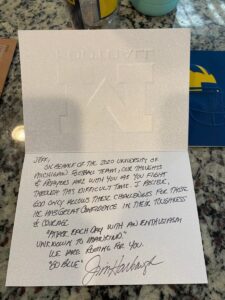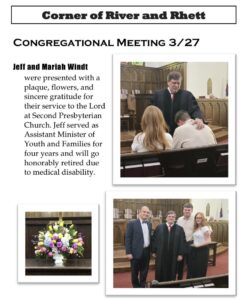Chapter 1
Jeff Windt enjoyed preaching and working with local families. The tools of his trade were words. For years, Jeff had been a pillar in his community. He was a leader at Second Presbyterian Church in Greenville, South Carolina, where he served as the Assistant Minister of Youth and Families for four years. Leading youth groups and bringing people together had always been a passion of Jeff’s. He also has a family of his own, three young boys and a wife, Mariah.
Then, everything changed one night in June 2020. At 44 years old, Jeff had an acute ischemic stroke at home. Ischemic strokes are the most common type of stroke, accounting for nearly 90% of stroke incidents each year.
“I heard Jeff’s phone hit the bathroom floor with a smack,” said Mariah Windt, Jeff’s wife. “That was a bit alarming because it was a brand new phone he had purchased the day before.”
Mariah said Jeff had come home from work that evening and complained of having a headache, but that he seemed normal — for him. She asked him what had happened with the phone, repeating the question when he didn’t respond. He just shook his head and said ‘I don’t know,’” she recalled. “It was a little odd but I didn’t dwell on it.”
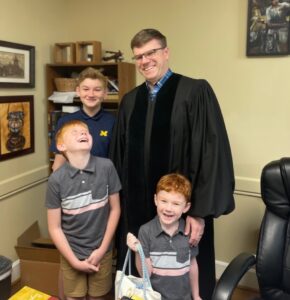
Jeff and his three sons, before his stroke. (Photo courtesy of Windt family.)
A Night They’ll Never Forget, Even Though They Wish They Could:
The family sat down and ate dinner together. During dinner, Jeff seemed to be acting normal. After dinner, while cleaning up, Mariah noticed Jeff pacing about the house. This again seemed odd to Mariah. It was at this point that she started keeping more of an eye on his behavior.
“I was trying not to overreact about the strangeness of his behavior but at the same time I just felt that something was wrong,” she said.
It was then that a friend called Jeff on the phone.
“They were on speaker phone, and I couldn’t really hear the conversation but I did notice that the other person was talking, but Jeff wasn’t really responding back,” she said. “The other person hung up, and when Jeff held his phone to hang up he dropped it in his lap and was having a hard time picking it back up. It was then I knew something was terribly wrong.”
Mariah went to their bedroom to take a moment to think. She began to look up the symptoms of a stroke and realized Jeff definitely had some of the symptoms.
She asked herself, Why would my husband be having a stroke? He was young. Perfectly healthy.
“In fact, he had just been to the doctor a couple of weeks before and had a clean checkup,” she said. “It seemed like the most far-off thing that could be happening BUT he still had a lot of the symptoms.” 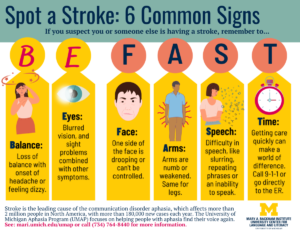
Mariah went back to the kitchen and found Jeff sitting at the dining room table. She went up and asked him what was wrong and for him to say something to her but he just stared at her. “I could see in his eyes that he wanted to say something, but he just couldn’t,” she said.
She then told him she was going to call 911.
When he didn’t say anything back to protest she knew something was definitely wrong.
The paramedics arrived and began evaluating Jeff. His blood pressure was extremely high and he had trouble answering their questions. The EMTs prepped Jeff to go to the hospital and Mariah hugged him and told him they would figure out what was going on.
Mariah was unable to go and be with Jeff at the hospital due to the COVID-19 restrictions that had been put in place.
Jeff remained in the hospital for 14 days. The family relied on their faith heavily during those two weeks, many nights signing off Facetime calls with prayer and song, Mariah said.
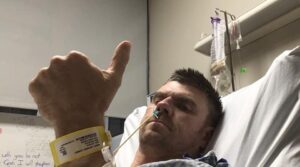
Jeff in the hospital after his stroke. (Photo courtesy of Windt family.)
On July 1, 2020, a speech therapist talked to Mariah and Jeff about the conditions Jeff developed after his stroke, and these included aphasia, hemiparesis, and apraxia. This was Mariah’s first time learning of the conditions and how they would affect her husband.
On July 3, 2020, Jeff was moved to the Roger C. Peace rehab facility, where he would remain for 25 days, completing extensive therapy sessions, six days a week. Because of visiting restrictions related to COVID-19, it was a few weeks before Mariah was eventually able to start attending some of Jeff’s sessions in-person.
While at the rehab facility, it was confirmed that he Jeff had Broca’s Aphasia and acquired apraxia.
“One of his therapists made a very good synopsis, describing someone’s brain before aphasia being a neatly categorized file box but after a stroke, everything gets thrown about and put back in,” Mariah said. “The retrieval part of words that Jeff is trying to communicate is being thwarted.”
“It wasn’t until towards the end of his therapy there that we realized, other than miraculous intervention, Jeff would never be able to preach again. This was very hard to wrap our minds around,” shared Mariah.
Broca’s Aphasia is a form of aphasia is known as non-fluent or expressive aphasia, according to the National Aphasia Association. People with this type of aphasia can communicate with simple grammatical sentences, but finding the right word or word-sound can be difficult.
Acquired Apraxia of Speech (AOS) is a speech disorder that affects the muscles used in saying words. People with AOS often have trouble saying what they are thinking, as the brain pathways involved struggle to plan and produce the right speech sounds, according to the National Institute of Health.
Chapter 2
Homecoming: The Church Community Steps In to Help
Nearly six weeks after the stroke, Jeff was able to come home on July 28, much to the excitement of his family and friends. During the time he was in rehab, the family leaned on the support of their church family especially to help with taking care of the boys. They would watch the boys during the day, taking them on adventures and outings to provide Mariah time to be with Jeff and take care of errands and help the boys relax for a bit.
Jeff underwent intensive therapy sessions at home throughout August and September. During this time, his communication challenges became even more clear to the family. The boys especially struggled with no longer being able to easily communicate with their dad, when less than a few months before, they could hold a full conversation with him. He was not able to play catch or chase them around the house anymore because of physical limitations.
It all had changed so much in such a short time.
In early fall, time was running out on the number of therapy sessions that insurance would cover. Then, the limit was hit in September. Mariah shared this news with their community and asked for any support they could provide — whether it be financial or just saying a prayer. Through a Facebook fundraiser, they were able to raise $15,355 for additional therapy sessions. The donations carried them through the end of 2020 and into 2021. However, even in the new year, the Windt family would continue to be tested.
Like many who have suffered a stroke, Jeff had a seizure. In February of 2021, Mariah was awakened when Jeff was having the seizure and called 911 for an ambulance.
Mariah explained, “Because of the damage in Jeff’s brain from the stroke, the cells that send electrical signals to the nerves in his body can have a sudden burst of electrical activity, which can cause the signals to the nerves to be disrupted, causing a seizure.”
A Year Makes All The Difference
One year to the day, on June 19, 2021, Mariah posted on Facebook:
“Hello Everyone!
Today marks a year since Jeff had his stroke that would completely alter our lives as we knew it.
I miss our life before his stroke on so many levels.
I miss staying up with him after the kids go to bed at night talking about this, that, and the other.
I miss watching him play catch with Jonah.
I miss him carrying Jude on his shoulders.
I miss watching him read books.
I miss him getting ready for church on Sunday’s and heading off to do what he was born to do in preaching God’s word.
I am also grateful for the Lord’s blessings he has bestowed on us.
I am grateful that Jeff and I can still communicate with each other even if it’s not in the way we used to.
I am grateful that he can watch Jonah and Elijah play catch together.
I am grateful for the close bond that Jeff and Jude have made through Jeff being at home during the day.
I am grateful that there is an app on his phone that he can use to have things read back to him in a way that he can understand.
I am grateful that Jeff is able to go to church on Sundays, walk into the Lord’s house, be comforted by the congregation he once preached to, and sit under the preaching of God’s word.”
A Beacon of Hope: U-M Aphasia Program
As they adjusted to the new reality a year out, Mariah began looking for aphasia therapy programs for Jeff.
“One night I looked up University Aphasia Programs,” she said. “When this aphasia program at U of M was the first one that popped up, I fell out of my chair!“
Jeff grew up in Bay City, Michigan, and has been a lifelong fan of the University of Michigan (U-M), especially the football program. His connection with U-M football stretched back to grade school. In 1986, Jim Harbaugh was a quarterback for U-M, and Jeff enjoyed following Harbaugh’s game statistics. He had no idea that this passion would lead to a personal encouraging message from Harbaugh someday.
Jeff has been a vocal U-M fan ever since, even after moving to South Carolina, and not meeting many other fans. His love of the university was widely shared with friends and family, especially since Jeff has a habit of only wearing U-M gear everywhere.
When Jeff exited inpatient therapy at their local rehab center in Greenville, Mariah received a phone call. The secretary asked them to come back, as there was a letter from the University of Michigan there addressed to Jeff.
When Mariah picked it up and opened it, she realized it was a personal card, written and signed by Jim Harbaugh, sent to Jeff.
Understanding the significance this would hold for her husband, Mariah planned a special event for Jeff to open the card. The card brought tears to Jeff’s eyes. It’s still one of his most prized possessions. However, the family had no idea how Jim had learned of Jeff, his situation, and his completing aphasia therapy in South Carolina. And it would remain a mystery for a while longer.
Chapter 3
Heading Home to Michigan
After Mariah discovered the U-M aphasia Program, she learned that the program is unique and that people from all over the world come to work on their aphasia recovery. She learned that “there’s nothing like it anywhere,” and that people come from across the world to take advantage of the specialized, intensive approach.
“After looking at all of the data outcomes and reading personal testimonials from individuals that have Jeff’s same degree of aphasia, I realized that there is no way he would walk out of this program without having made some sort of improvement,” she said. “Any improvement at all, no matter how small, is going to improve his quality of life. It seemed too good to be true though. The logistics of it all made it seem like an impossibility.“
Mariah shared her discovery with Rick Phillips, the senior pastor of their church and a good friend of Jeff’s, who also happens to be a U-M graduate. However, she was worried about the cost and logistics of caring for their children while they were away. Rick was adamant that Jeff should go, and that “God would take care of the way to get us there,” Mariah recalled.
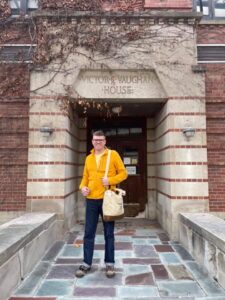
Jeff standing in front of the University of Michigan Aphasia Program is located. (Photo courtesy of Windt family.)
Their good friend Melton Duncan started a GoFundMe to help raise money for Jeff and Mariah to attend the U-M Aphasia Program (UMAP). Within just three weeks, they had raised enough money to cover the costs for the intensive, comprehensive aphasia program, travel, etc.
They attended in November 2021. The in-person session had Jeff working on speech and communication therapy daily from 9 a.m. to 3 p.m. with experienced speech-language pathologists who knew aphasia and how to approach his specific situation.
On November 8, Mariah shared this update via Facebook:
“Jeff had assessments done where a series of tests were used to evaluate where he is at in regards to Verbal and Written Expression, Naming/Word Finding, Sentence Formulation, and Auditory and Reading Comprehension.
He was then given a treatment plan based on those results. His treatment plan is very personalized in that they tailor it to his specific needs and personal goals.
Some goals:
- Being able to say the boys’ names.??
- Reading (without assistance from an app to read it back to him).
- Formulating a prayer. (As I have stated in previous [Facebook] posts, aphasia affects his word-finding ability whether or not he is trying to say, write, type, or even formulate a coherent thought in his own mind).
- Writing a complete sentence.
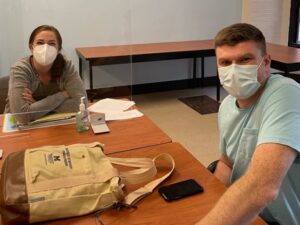
Jeff working with Keli, a senior speech-language pathologist at UMAP. (Photo courtesy of Windt family.)
It was clearly evident that we were in the right place for Jeff’s treatment from the first day here at UMAP. To say that the therapists are amazing is an understatement. Each and every one of them has so much compassion for Jeff and shows a drive and enthusiasm to do anything they can to help him improve.
Thank you all for the prayers and contributions that have allowed Jeff to take advantage of this wonderful program.”
Hard Work and Homework
Jeff completed one session of the intensive, individual program at the U-M Aphasia Program, and he and Mariah returned home in late November.
On November 23, Mariah shared this update on Facebook:
“While we’re so thankful to be home, Jeff and I left Ann Arbor with heavy hearts having to say goodbye to the very special group of therapists that worked with Jeff the 3 weeks we were there. Each of them went above and beyond any expectations that we might have had and I attribute Jeff’s improvements to their expertise and encouragement.
I also can’t forget to mention Jeff’s hard work and determination. His therapists would commend him for his positive attitude and perseverance. A lot of times when he couldn’t do something he would just laugh as if to say “What are you gonna do?”
Chapter 4
Mystery Solved!
While in Ann Arbor, Jeff was able to attend a University of Michigan football game. Mariah asked family friend Andrew if he wanted to join Jeff for the game.
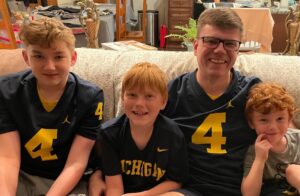
Jeff and his sons, wearing University of Michigan gear. (Photo courtesy of Windt family.)
This question prompted tears from Andrew – he was the person who had reached out to Jim Harbaugh for a letter. A long-time friend of Jeff, when Jeff went into initial therapy after his stroke, Andrew figured it wouldn’t hurt to reach out to Jim and see if he would write a message to Jeff.
Andrew reached out to Harbaugh via email, but never heard back, or knew if his message had been received. He kept his request a surprise and never told the family about what he had done. When Mariah posted the video of Jeff reacting to Harbaugh’s message, that’s when he know his request had been answered.
The rest of 2021 passed uneventfully. The family enjoyed being able to communicate more with Jeff and spent the holidays with each other and of course, enjoyed watching University of Michigan football games.
They appreciated being able to attend services again at their church.
In 2022, they continued moving forward. However, an official decision had to be made regarding Jeff’s ability to minister.
At 46 years old, Jeff became a retired Presbyterian Pastor due to a medical disability.
On March 27, 2022, their church congregation had a service dedicated to Jeff and gifted him with a plaque thanking him for his contributions. Members lined up to give them encouragement after the service.
Mariah shared thoughts from the day on Facebook on May 9, 2022:
“In spite of such a sorrowful occasion we felt sincerely loved by the members of SPC. It’s because of this love, support, and care that we have received from this congregation that we will never leave Greenville, SC. Our home is with our people.”
Continuing Down the River of Life
In the summer of 2022, Jeff achieved more personal physical milestones.
He traveled to the Grand Canyon on a trip with his friend Marcus. They camped and went rafting for four days to complete 187 miles – the longest Jeff has ever been away from his family and without communication tools since his stroke.
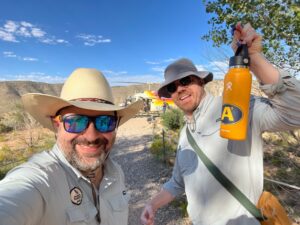
Jeff and Marcus while on the hiking trip. (Photo courtesy of Windt family.)
Typically, Jeff uses his cell phone, paper, pencil, or other tools to help communicate his thoughts. However, he had no cell reception during this trip, could not carry other tools as they were backpacking, and couldn’t use paper notes due to the physical nature of rafting and the possibility of them getting wet.
Many people on the trip did not know Jeff had aphasia, initially. However, they rallied around him and supported him every step of the way as they went deeper into the wilderness. Jeff was the first person to go on the tour who had survived a stroke.
What’s Next?
Today, Jeff continues to work with the U-M Aphasia Program by attending virtual therapy sessions for an hour each week. His primary UMAP speech pathologist, Keli Licata, said, “Jeff is truly such a pleasure to work with every week!”
“He is an incredible communicator — resourceful, strategic, and persistent — and even though it’s often hard for him to verbalize what he wants to say, which is of course immensely frustrating for him, he is fiercely determined,” she said. “And he consistently does an amazing job of getting his intended messages across, by gesturing, writing words, drawing diagrams, using some of the personalized communication tools that we’ve developed together, showing text and images on his phone, and retrieving any other relevant items around him that might help him convey his thoughts.”
Keli noted that it’s not surprising that Jeff has an inspiring drive to help others, like sharing his story and being open about his experiences, given his chosen vocation.
“His decision to share his personal story openly, while he and his family continue to navigate life with aphasia, is, I think, extremely meaningful and admirable – and I know others will benefit from reading about his challenges and achievements.”

Jeff and Mariah. (Photo courtesy of Windt family.)
Due to Jeff’s stroke and aphasia, he now is more expressive and smiles a lot more than he used to. His happiness and joy are very infectious to others, including strangers. People will ask Mariah, “How is he in such a good mood, even when he can’t talk?”
Jeff attributes strength to his family, friends, and faith (and the University of Michigan, of course). He enjoys watching U-M games at home, especially as it’s also a way to connect with his sons. One of Jeff’s core phrases that he started working on while at UMAP, along with saying family names, was “Go Blue!”
End note #1: If you are interested in listening to some of Jeff’s sermons, please visit https://sermons.spcgreenville.org/sermons/speakers/Jeff%20Windt/.
End note #2: If you or someone you know is interested in learning more about the University of Michigan Aphasia Program, please visit our website to learn more.
About the U-M Aphasia Program and UCLL
The University Center for Language and Literacy (UCLL) is committed to helping people of all ages find meaningful ways to communicate. UCLL is part of the Mary A. Rackham Institute (MARI) at the University of Michigan. MARI provides high-quality, individualized mental health, neuropsychological testing, and language and literacy services to the community through its service centers, including UCLL, University Center for the Child and Family (UCCF), and University Psychological Clinic.


